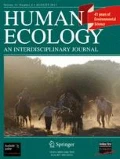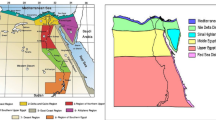Abstract
This paper describes West African farming practices and knowledge that lead to the formation of carbon-rich high-fertility African Dark Earths (AfDE) – human-made soils analogous to Amazonian terra preta, yet subject to continuing production and use. Gender relations and women’s roles are central to how these soils are produced and used. Through social and ecological field studies in Liberia and Sierra Leone we detail how AfDE formation and associated knowledge is gender-differentiated, the central roles of women’s deposition of charred organic materials from cooking, oil palm processing and potash production in producing AfDE, and the gendered dynamics of AfDE use and distribution in the landscape. Different species are cultivated in AfDE compared to non-anthropogenic soils, and AfDE are differentially valued by women and men for horticultural and tree crops. The spatial distribution of AfDE across the landscape reflects shifting household, marriage and settlement practices. Gender relations, subjectivities and interdependencies and the ecology of soils and landscapes mutually shape one another. National policymakers and NGOs planning or managing agricultural carbon projects in West Africa should attend to the knowledge and practices of Loma and Mende women and men who have made and cultivated carbon-rich anthropogenic soils in the region for generations.





Similar content being viewed by others
References
Agarwal, B. (1992). The Gender and Environment Debate: Lessons from India. Feminist Studies 18(1): 119–158.
Andriesse, W., and Fresco, L. O. (1991). A characterization of rice-growing environments in West Africa. Agriculture, Ecosystems & Environment 33(4): 377–395.
Atran, S. (1993). Cognitive Foundations of Natural History: Towards an Anthropology of Science. Cambridge University Press, Cambridge.
Bailey, D. M. (1999). Sebakh, Sherds and Survey. The Journal of Egyptian Archaeology 85: 211–218.
Barad, K. (2007). Meeting the Universe Halfway: Quantum Physics and the Entanglement of Matter and Meaning. Duke University Press, Durham, NC.
Barrera-Bassols, N., and Zinck, J. A. (2003). Ethnopedology: a worldwide view on the soil knowledge of local people. Geoderma 111(3–4): 171–195.
Berlin, B. (1992). Ethnobiological classification: principles of categorization of plants and animals in traditional societies. Princeton University Press, Princeton.
Bernard, H. R. (2006). Research methods in anthropology: qualitative and quantitative approaches (4th, Editionth ed. Altamira Press, Oxford.
Biederman, L. A., and Harpole, W. S. (2013). Biochar and its effects on plant productivity and nutrient cycling: a meta-analysis. GCB Bioenergy 5(2): 202–214 doi:10.1111/gcbb.12037.
Birmingham, D. M. (2003). Local knowledge of soils: the case of contrast in Côte d’Ivoire. Geoderma 111: 481–502.
Bledsoe, C. (1984). The political use of Sande ideology and symbolism. American Ethnologist 11(3): 455–472.
D’Andrea, A. C., Logan, A. L., and Watson, D. J. (2006). Oil palm and prehistoric subsistence in tropical West Africa. Journal of African Archaeology 4(2): 195–222.
Elmhirst, R., and Resurreccion, B. (2008). Gender, environment and natural resource management: new directions, new debates. In Elmhirst, R., and Resurreccion, B. (eds.), Gender and natural resource management: livelihoods, mobility and interventions. Earthscan, London, pp. 3–22.
Fairhead, J., and Leach, M. (1996). Misreading the African Landscape: Society and Ecology in a Forest-Savanna Mosaic. Cambridge University Press, Cambridge.
Fairhead, J., Geysbeek, T., Holsoe, S. E., and Leach, M. (2003). African-American Exploration in West Africa: Four Nineteenth-Century Diaries. Indiana University Press, Bloomington, IN.
Fairhead, J., Leach, M., and Amanor, K. (2012). Anthropogenic dark earths and Africa: A political agronomy of research disjunctures. In Sumberg, J., and Thompson, J. (eds.), Contested Agronomy: Agricultural Research in a Changing World. Routledge, London.
Ferme, M. (2001). The Underneath of Things: Violence, history and the everyday in Sierra Leone. Berkeley University of California Press
Forsyth, T. (2003). Critical Political Ecology. Routledge, London.
Green, C., Joekes, S., and Leach, M. (1998). Questionable links: approaches to gender in environmental research and policy. In Jackson, C., and Pearson, R. (eds.), Feminist visions of development: gender analysis and policy. Routledge, London, pp. 259–283.
Hartley, C. W. S. (1977). The Oil Palm (Elaeis guineensis Jacq.). Longman, London.
Hawkins, R., and Ojeda, D. (2011). Gender and environment: critical tradition and new challenges. Environment and Planning D: Society and Space 29: 237–253.
Hovorka, A. (2006). The No. 1 Ladies’ Poultry Farm: A Feminist Political Ecology of Urban Agriculture in Botswana. Gender, Place and Culture 13(3): 207–255.
Ingold, T. (1993). The temporality of the landscape. World Archaeology 25(2): 152–174.
Irvine, F. R. (1969). West African Crops, 3rd ed. Oxford University Press, London.
Jones, A. (1983). From Slaves to Palm Kernels: A History of the Galinhas Country (West Africa), 1730–1890. Köppe, Frankfurt.
Jones, C. G., Lawton, J. H., and Shachak, M. (1994). Organisms as ecosystem engineers. Oikos 69: 373–386.
Leach, M. (1994). Rainforest Relations: Gender and Resource use among the Mende of Gola, Sierra Leone. Edinburgh University Press, Edinburgh.
Leach, M., and Fairhead, J. (1995). Ruined settlements and new gardens: gender and soil ripening among Kuranko farmers in the forest-savanna transition zone. IDS Bulletin 26(1): 24–32.
Leach, M., Scoones, I., and Stirling, A. (2010). Dynamic Sustainabilities: Technology, environment, social justice. Earthscan, London.
Lee, J. (2012). Smallholder agricultural carbon projects in Ghana: Benefits, barriers, and institutional arrangements. CCAFS Working Paper no.30, CGIAR Research Program on Climate Change, Agriculture and Food Security (CCAFS). Copenhagen, Denmark. Available online at: www.ccafs.cgiar.org.
Lehmann, J., and Joseph, S. (eds.) (2009). Biochar for environmental management: science and technology. Earthscan, London.
Leopold, R.S. (1991). Prescriptive Alliance and Ritual Collaboration in Loma Society. (Unpublished PhD Dissertation), Indiana University, Bloomington.
Logan, A. L., and D’Andrea, A. C. (2012). Oil palm, arboriculture, and changing subsistence practices during Kintampo times (3600–3200 bp, Ghana). Quaternary International 249: 63–71.
McCormack, S. A., Ostle, N., Bardgett, R. D., Hopkins, D. W., and Vanbergen, A. J. (2013). Biochar in bioenergy cropping systems: impacts on soil faunal communities and linked ecosystem processes. GCB Bioenergy 5(2): 81–95 doi:10.1111/gcbb.12046.
Mies, M., and Shiva, V. (1993). Ecofeminism. Zed Books, London.
Nightingale, A. (2006). The nature of gender: work, gender, and environment. Environment and Planning D: Society and Space 24: 165–185.
Peet, R., and Watts, M. (2004). Liberation Ecologies: Environment, Development, Social Movements. Routledge, New York.
Richards, P. (1985). Indigenous Agricultural Revolution: Ecology and Food Production in West Africa. Hutchinson & Co., London.
Rocheleau, D., Thomas-Slayter, B., and Wangari, E. (1996). Feminist Political Ecology: Global Perspectives and Local Experiences. Routledge, London.
Schmidt, M. (2013). Amazonian Dark Earths: pathways to sustainable development in tropical rainforests? Boletim do Museu Paraense Emílio Goeldi. Ciências Humanas 8: 11–38.
Schroeder, R. A. (1999). Shady practices: agroforestry and gender politics in The Gambia. University of California Press, Berkeley, CA.
Schulz, H., Dunst, G. and Glaser, B. (2013). Positive effects of composted biochar on plant growth and soil fertility. Agronomy for Sustainable Development, 1–11. doi: 10.1007/s13593-013-0150-0
Scoones, I. (1999). New ecology and the social sciences: What prospects for a fruitful engagement? Annual Review of Anthropology 28: 479–507.
Shiva, V. (1989). Staying Alive. Zed Press, London.
Sillitoe, P. (ed.) (2007). Local Science vs. Global Science: Approaches to indigenous knowledge in international development. Bergahn Books, New York.
Solomon, D., Lehmann, J., Fraser, J.A., Leach, M., Amanor, K., Frausin, V., Kristiansen, S., Millimouno, D., Fairhead, J. (n.d.). Indigenous African soil enrichment as climate-smart sustainable agriculture alternative. Manuscript.
Sparrevik, M., Field, J. L., Martinsen, V., Breedveld, G. D., and Cornelissen, G. (2012). Life Cycle Assessment to Evaluate the Environmental Impact of Biochar Implementation in Conservation Agriculture in Zambia. Environmental Science & Technology doi:10.1021/es302720k.
Sultana, F. (2009). Fluid lives: subjectivities, gender and water in rural Bangladesh. Gender, Place and Culture 16: 427–444.
Sutrop, U. (2001). List task and a cognitive salience index. Field Methods 13(3): 263–276.
Thomas-Slayter, B., and Rocheleau, D. (1995). Gender, Environment and Development in Kenya: Perspectives from the Grassroots. Lynn Rienner, Boulder.
Vayda, A. P., and Walters, B. B. (1999). Against political ecology. Human Ecology 27: 167–179.
Walker, P. (2005). Political ecology: where is the ecology? Progress in Human Geography 29(1): 73–82.
Whitman, T., Nicholson, C. F., Torres, D., and Lehmann, J. (2011). Climate Change Impact of Biochar Cook Stoves in Western Kenyan Farm Households: System Dynamics Model Analysis. Environmental Science & Technology 45(8): 3687–3694 doi:10.1021/es103301k.
Zimmerer, K. S., and Bassett, T. J. (2003). Political ecology: an integrative approach to geography and environment-development studies. Guilford Press, New York.
Acknowledgments
This article draws on research funded by the UK Economic and Social Research Council (ESRC RES-062-23-2310) through the grant ‘Anthropogenic dark earths in Africa?’ to Sussex University, and the ‘Biochar’ project of the ESRC STEPS (Social, Technological and environmental Pathways to Sustainability) Centre, and we gratefully acknowledge this financial support. We thank too, other members of the collaborative research programme from which the research reported here derives, including soil scientists Johannes Lehmann and Dawit Solomon at Cornell University, Søren M. Kristiansen at Aarhus University, Denmark and anthropologists Kojo Amanor at the University of Legon in Ghana and Dominique Millimouno at Cabinet Universitaire de Recherches-Actions, Kissidougou, Republic of Guinea. Our joint work is cited. Thanks are also due to the townspeople of Wenwuta, Mapuma, Buma and Yanihun; to Hans-Peter Mueller and the Welthungerhilfe/Food Security and Economic Development project in Sierra Leone and to Jeanette Carter of the University of Liberia for their assistance and support. We thank Moussa Diabaté, Pépé Beavogui and Kaman Guilavogui of IRAG, CRA, Seredou, Guinea and Carel Jonkind, of Wageningen University for assistance in plant and tree identification. Any errors of fact and judgment rest with the authors.
Author information
Authors and Affiliations
Corresponding author
Rights and permissions
About this article
Cite this article
Frausin, V., Fraser, J.A., Narmah, W. et al. “God Made the Soil, but We Made It Fertile”: Gender, Knowledge, and Practice in the Formation and Use of African Dark Earths in Liberia and Sierra Leone. Hum Ecol 42, 695–710 (2014). https://doi.org/10.1007/s10745-014-9686-0
Published:
Issue Date:
DOI: https://doi.org/10.1007/s10745-014-9686-0




